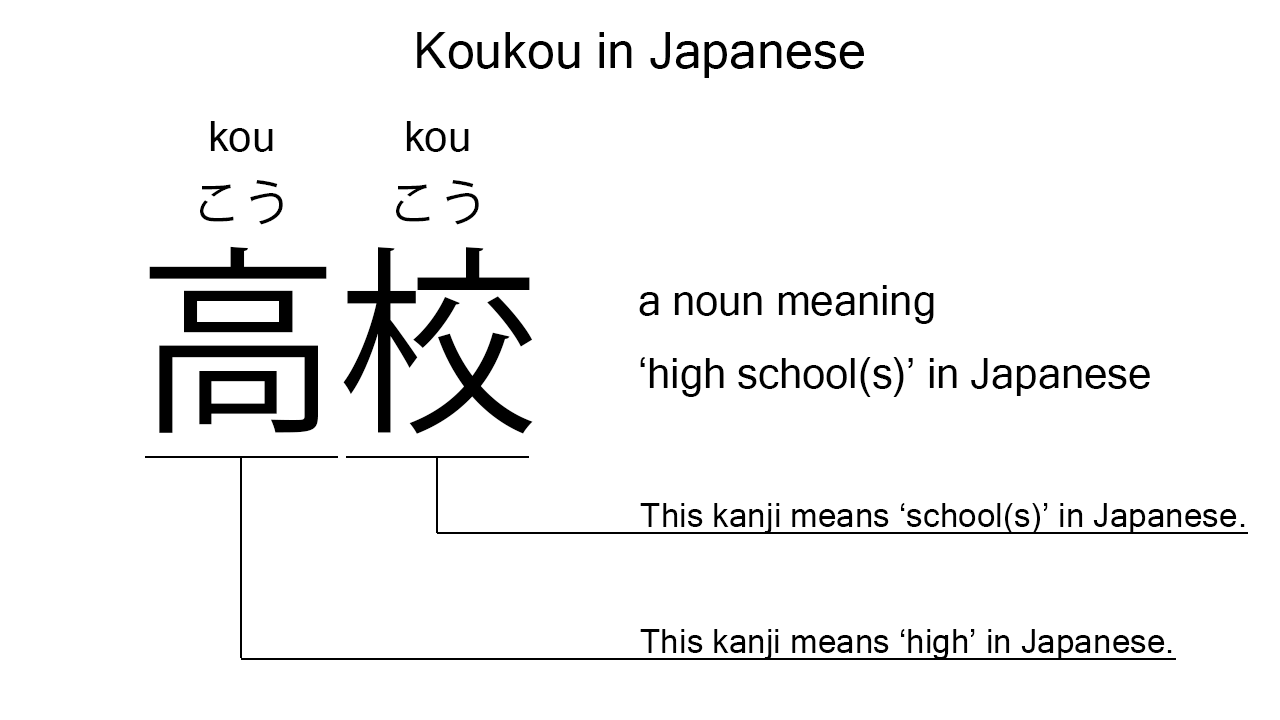What does “koukou” mean in Japanese?
There are homophones, but native speakers say “koukou” normally to mean ‘high school’ in Japanese. Perhaps, some Japanese learners know this word as it is sometimes used in Japanese conversations. In this blog post, however, I will explain it in detail based on its kanji expression. And also, I will explain how to use it through example sentences. My explanations would help Japanese learners understand “koukou” more clearly. Then, let’s get started!
Contents
Definition and meaning of “koukou”
Let me start with the definition and meaning of “koukou”.
- koukou – 高校 (こうこう) : a noun meaning ‘high school’ in Japanese. This can also work as plural. Learn more about Japanese plural.
This is officially the shortened version of “koutou gakkou”, but widely used as an individual word to refer to a high school or high schools in Japanese.
The definition and meaning are simple and clear. To understand this noun more clearly, however, let me explain its kanji characters in detail, one by one.
What does “koukou” literally mean in Japanese?
The kanji expression of “koukou” consists of the following two kanji characters:
- 高 : a kanji character widely used to mean ‘high’ in Japanese. This can also be found in other words like “takai“.
- 校 : a kanji character sometimes used to mean ‘school’ in Japanese.
From these two kanji characters, we can understand that “koukou” literally means a ‘high school’ in Japanese. This literal interpretation is completely in line with the actual meaning.

When we meet new kanji expressions, we should check their kanji characters in detail to understand their meanings clearly and deeply. In many cases, kanji characters tell us a lot about the meanings of the expressions they form. Actually, here, we could get the better understanding of “koukou” through the detailed kanji check above.
So far, I’ve explained the definition and meaning of “koukou” together with its kanji characters. Then, let me explain how to use it through the example sentences below.
Example #1: how to say “high school” in Japanese
watashi wa koukou ga suki desu – 私は高校が好きです (わたしはこうこうがすきです)
I love my high school.
Below are the new words used in the example sentence.
- watashi – 私 (わたし) : a pronoun meaning ‘I’ in Japanese.
- wa – は : a binding particle working as a case marker or topic marker. In the example, this works after “watashi” to make the subject in the sentence.
- ga – が : a case particle used to make the subject word or the object word in a sentence. In the example, this is used after “koukou” to make the object in the sentence.
- suki – 好き (すき) : the stem part of the na-adjective, “sukina”, which means ‘favorite’ in Japanese. Native speakers, however, often use this as an individual word to mean ‘to like’ or ‘to love’ in Japanese. In the example, this is used to mean ‘to love’.
- desu – です : an auxiliary verb used after a noun or adjective to make it polite. Probably, this is well known as a part of Japanese desu form. In the example, this is used after “suki” to make it sound polite.
This is a typical usage of “koukou”. In this example, it works together with the case particle, “ga”, to become the object in the sentence.
Example #2: another usage of “koukou”
kanojo wa koukou no sensei desu yo – 彼女は高校の先生ですよ (かのじょはこうこうのせんせいですよ)
She is a high school teacher.
Below are the new words used in the example sentence.
- kanojo – 彼女 (かのじょ) : a pronoun meaning ‘she’ in Japanese.
- no – の : a case particle used to join two nouns. Normally, the first one can work as a modifier to describe the second. In the example, this is used to join “koukou” and “sensei”. The formed phrase literally means a ‘high school teacher’ in Japanese.
- sensei – 先生 (せんせい) : a noun meaning ‘teacher’ in Japanese. This can also work as plural.
- yo – よ : a sentence-ending particle used to state the fact or idea softly. As the definition suggests, this is used at the end of the example sentence to state the fact softly.
This is another typical usage of “koukou”. In this example, it works together with “no” and “sensei” to mean a ‘high school teacher’ in Japanese. When we want to mean a ‘high school’ in Japanese, anyway, this noun is always a very good option.
Summary
In this blog post, I’ve explained the definition and meaning of “koukou” in detail based on its kanji expression. And also, I’ve explained how to use it through the example sentences. Let me summarize them as follows.
- koukou – 高校 (こうこう) : a noun meaning ‘high school’ in Japanese. This can also work as plural. This is officially the shortened version of “koutou gakkou”, but widely used as an individual word to mean a high school in Japanese. These two kanji characters literally mean a ‘high school’ in Japanese. This literal interpretation is completely in line with the actual meaning.
Hope my explanations are understandable and helpful for Japanese learners.
I Appreciate ur blog.love it.more for us learning your language..arigatoooo
Thank you for your comment! This keeps me motivated! Kochira koso arigatou 🙂